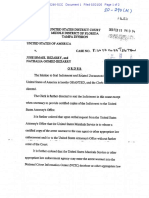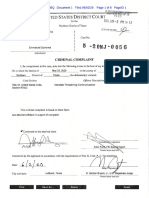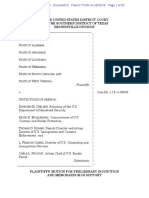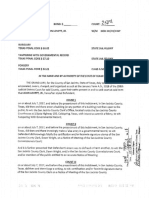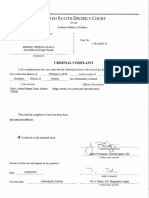0 ratings0% found this document useful (0 votes)
1K views3 pagesMemo From Acting AG Regarding Immigration Enforcement
The U.S. Department of Justice has issued interim policy changes regarding charging, sentencing, and immigration enforcement in response to Executive Orders from President Trump. The new policies emphasize aggressive prosecution of serious offenses, particularly those related to transnational criminal organizations and illegal immigration. The memorandum outlines the responsibilities of U.S. Attorneys and the coordination required among various law enforcement agencies to implement these changes effectively.
Uploaded by
Bob PriceCopyright
© © All Rights Reserved
Available Formats
Download as PDF or read online on Scribd
Download as pdf
0 ratings0% found this document useful (0 votes)
1K views3 pagesMemo From Acting AG Regarding Immigration Enforcement
The U.S. Department of Justice has issued interim policy changes regarding charging, sentencing, and immigration enforcement in response to Executive Orders from President Trump. The new policies emphasize aggressive prosecution of serious offenses, particularly those related to transnational criminal organizations and illegal immigration. The memorandum outlines the responsibilities of U.S. Attorneys and the coordination required among various law enforcement agencies to implement these changes effectively.
Uploaded by
Bob PriceCopyright
© © All Rights Reserved
Available Formats
Download as PDF or read online on Scribd
Download as pdf
Download as pdf
You are on page 1/ 3
U.S. Department of Justice
Office of the Deputy Attorney General
Washington, DC 20530
January 21, 2025
MEMORANDUM FOR ALL DEPARTMENT EMPLOYEES
FROM: THE ACTING DEPUTY ATTORNEY GENERAL 43>
SUBJECT: Interim Policy Changes Regarding Charging, Sentencing, And
Immigration Enforcement
Following President Trump’s second inauguration yesterday, I write regarding interim
decisions and policy changes pending confirmation of the Attorney General.! These interim
changes are necessary as an initial response to Executive Orders that President Trump issued
yesterday, critical to the Justice Department's mission, and part of the response to three of the
‘most serious threats facing the American people. First, Cartels and other Transnational Criminal
Organizations, such as Tren de Aragua (TdA) and La Mara Salvatrucha (MS-13), are a scourge
on society resulting in an unstable and unsafe border and huge flows of illegal immigration in
violation of U.S. law. Second, brutal and intolerable violent crime by members of these
organizations and illegal aliens is escalating rapidly across the country. Third, the fentany! crisis
and opioid epidemic are poisoning our communities and have inflicted an unprecedented toll of
addiction, suffering, and death.
The Justice Department must, and will, work to eradicate these threats. Indeed, itis the
responsibility of the Justice Department to defend the Constitution and, accordingly, to lawfully
execute the policies that the American people elected President Trump to implement. The
Justice Department's responsibility, proudly shouldered by each of its employees, includes
aggressive enforcement of laws enacted by Congress, as well as vigorous defense of the
President’s actions on behalf of the United States against legal challenges. The Department's
personnel must come together in the offices that taxpayers have funded to do this vitally
important work.
L Core Principle: Pursuing The Most Serious, Readily Provable Offense
Interim changes to the Justice Department's policy regarding charging and sentencing are
necessary in order to implement policies articulated in President Trump's January 20, 2025
Executive Orders relating to the elimination of Cartels and other Transnational Criminal
Organizations, and securing our borders against illegal immigration and drug trafficking,
Therefore, effective today. the Justice Department's interim policy regarding charging and
This interim guidance is not intended to, does not, and may not be relied upon to create, any
right or benefit, substantive or procedural, enforceable at law or in equity by any party against
the United States, its departments, agencies, or entities, its officers, employees, or agents, or any
other person.
Memorandum from the Acting Deputy Attomey General Page 2
Subject: Interim Policy Changes Regarding Charging, Sentencing, And Immigration Enforcement
sentencing is set forth in the May 10, 2017 Memorandum entitled, “Department Charging and
Sentencing Policy,” which applies to all charging decisions at the Department of Justice and the
USS. Attomey’s Offices. Any inconsistent previous policy of the Department of Justice relating
to charging and sentencing policy is rescinded, effective today.”
Specifically, in the absence of unusual facts, prosecutorial discretion at the Department of
Justice and the U.S. Attorney's Offices is bounded by the core principle that prosecutors should
charge and pursue the most serious, readily provable offenses. The most serious offenses are
those punishable by death where applicable, and offenses with the most significant mandatory
minimum sentences (including under the Armed Career Criminal Act and 21 U.S.C. § 851) and
the most substantial recommendation under the Sentencing Guidelines.
Each United States Attorney and Assistant Attomey General is responsible for ensuring
that this interim policy is implemented and followed. Any deviations from the interim policy’s
core principle require significant extenuating circumstances, shall be carefully considered, and
must be approved consistent with the process described in the May 10, 2017 Memorandum.
Fi
ful Execution of the Immigration Laws
Consistent with President Trump’s January 20, 2025 Executive Order entitled,
“Protecting The American People Against Invasion,” the Department of Justice will take all steps
necessary to protect the public and secure the American border by removing illegal aliens from
the Country and prosecuting illegal aliens for crimes committed within U.S. jurisdiction. These
steps shall include, but not be limited to, the following:
Consistent with the core principle of pursuing the most serious, readily provable offense,
USS. Attomey’s Offices and the other components shall pursue charges relating to criminal
immigration-related violations when such violations are presented by federal, state, or local law
enforcement or the Intelligence Community. See, e.g., 8 U.S.C. §§ 1324(c), 1252c (authorizing
certain immigration-related arrests by State and local law enforcement officials). This includes,
where supported by evidence, prosecutions for violations of 8 U.S.C. §§ 1304, 1306, 1324-1328,
1373 and 18 U.S.C. § 922(gX(5). Each U.S, Attorney’s Office shall coordinate as appropriate
with the federal courts to inform the courts of this interim policy and develop processes for
handling the increased number of prosecutions that will result. Declination decisions relating to
immigration-related conduct shall be disclosed as Urgent Reports pursuant to Justice Manual
§ 1-13.13. On a quarterly basis, the U.S. Attorney's Offices shall report statistics to EOUSA,
broken down by law enforcement agency, regarding the number of immigration-related cases
referred to the Office, the number of pending immigration-related investigations and
prosecutions, the number of immigration-related convictions, and the resulting sentences and
removals.
2 The previous policies and guidance rescinded include: “General Department Policies Regarding
Charging, Pleas, and Sentencing” (December 16, 2022); “Interim Guidance on Prosecutorial
Diseretion, Charging, and Sentencing” (January 29, 2021); “Department Policy on Charging
Mandatory Minimum Sentences and Recidivist Enhancements in Certain Drug Cases” (August
12, 2013); and “Guidance Regarding § 851 Enhancements in Plea Negotiations” (September 24,
2014).
Memorandum from the Acting Deputy Attomey General Page 3
Subject: Interim Policy Changes Regarding Charging, Sentencing, And Immigration Enforcement
‘The Organized Crime Drug Enforcement Task Force (OCDETF) and the Project Safe
Neighborhoods (PSN) program shall establish national initiatives to provide focused resources
and attention to immigration-related prosecutions at the federal, state, and local levels. OCDETF
and PSN will focus on facilitating access by U.S. Attorney's Offices to existing structures in
which the Justice Department participates, such as Joint Task Force Vulean, which targets MS-
13 and will be expanded to target TA, and Joint Task Force Alpha, which targets human
trafficking. The regional OCDETF Strike Forces shall prioritize the investigation and
prosecution of immigration offenses, including by requiring OCDETF-funded AUSAS to devote
significant time and attention to the investigation and prosecution of these crimes. The new
OCDETF and PSN national initiatives shall also prioritize enhanced statistical tracking of these
efforts.
Pending implementation of the Homeland Security Task Forces announced by President
Trump on January 20, 2025, the FBI's Joint Terrorism Task Forces are directed to coordinate
with DHS, as well as state and local members, to assist in the execution of President Trump's
immigration-related initiatives. The FBI, DEA, ATF, USMS, and BOP shall review their files
for identifying information and/or biometric data relating to non-citizens located illegally in the
United States. All such information and data shall be disclosed to DHS, for the sole purpose of
facilitating appropriate removals, enforcement actions, and immigration-related investigations
and prosecutions, unless the agency possessing the information and data determines that a
particular disclosure would compromise a significant law enforcement investigation and the U.S.
‘Attomey’s Office participating in the investigation concurs in writing with the agency’s non-
disclosure determination. The agencies’ reviews and disclosures shall be completed in 60 days.
Concurrences by U.S. Attomey’s Offices in non-disclosure determinations shall be disclosed as,
Urgent Reports pursuant to Justice Manual § 1-13.130.
‘The Supremacy Clause and other authorities require state and local actors to comply with
the Executive Branch’s immigration enforcement initiatives. Federal law prohibits state and
local actors from resisting, obstructing, and otherwise failing to comply with lawful immigration-
related commands and requests pursuant to, for example, the President's extensive Article II
authority with respect to foreign affairs and national security, the Immigration and Nationality
‘Act, and the Alien Enemies Act. The U.S. Attorney's Offices and litigating components of the
Department of Justice shall investigate incidents involving any such misconduct for potential
prosecution, including for obstructing federal functions in violation of 18 U.S.C. § 371, and
violations of other statutes, such as 8 U.S.C. §§ 1324, 1373. Declination decisions with respect
to resistance, obstruction, or other non-compliance with lawful immigration-related commands
and requests from federal authorities shall be disclosed as Urgent Reports pursuant to Justice
Manual § 1-13.130.
Finally, laws and actions that threaten to impede Executive Branch immigration
initiatives, including by prohibiting disclosures of information to federal authorities engaged in
immigration-enforcement activities, threaten public safety and national security. The Civil
Division shall work with the newly established Sanctuary Cities Enforcement Working Group,
within the Office of the Associate Attorney General, to identify state and local laws, policies, and
activities that are inconsistent with Executive Branch immigration initiatives and, where
appropriate, to take legal action to challenge such laws
You might also like
- The Subtle Art of Not Giving a F*ck: A Counterintuitive Approach to Living a Good LifeFrom EverandThe Subtle Art of Not Giving a F*ck: A Counterintuitive Approach to Living a Good Life4/5 (6091)
- The Gifts of Imperfection: Let Go of Who You Think You're Supposed to Be and Embrace Who You AreFrom EverandThe Gifts of Imperfection: Let Go of Who You Think You're Supposed to Be and Embrace Who You Are4/5 (1146)
- Never Split the Difference: Negotiating As If Your Life Depended On ItFrom EverandNever Split the Difference: Negotiating As If Your Life Depended On It4.5/5 (922)
- Hidden Figures: The American Dream and the Untold Story of the Black Women Mathematicians Who Helped Win the Space RaceFrom EverandHidden Figures: The American Dream and the Untold Story of the Black Women Mathematicians Who Helped Win the Space Race4/5 (946)
- The Hard Thing About Hard Things: Building a Business When There Are No Easy AnswersFrom EverandThe Hard Thing About Hard Things: Building a Business When There Are No Easy Answers4.5/5 (361)
- The World Is Flat 3.0: A Brief History of the Twenty-first CenturyFrom EverandThe World Is Flat 3.0: A Brief History of the Twenty-first Century3.5/5 (2283)
- Devil in the Grove: Thurgood Marshall, the Groveland Boys, and the Dawn of a New AmericaFrom EverandDevil in the Grove: Thurgood Marshall, the Groveland Boys, and the Dawn of a New America4.5/5 (275)
- America Invaded - How The Biden-Harris Border Crisis Is Fundamentally Transforming The United States100% (4)America Invaded - How The Biden-Harris Border Crisis Is Fundamentally Transforming The United States36 pages
- Robb Elementary Investigative Committee Report75% (4)Robb Elementary Investigative Committee Report82 pages
- A Heartbreaking Work Of Staggering Genius: A Memoir Based on a True StoryFrom EverandA Heartbreaking Work Of Staggering Genius: A Memoir Based on a True Story3.5/5 (692)
- Federal Indictment of Jose Irizarry and Nathalia Gomez-IrizarryNo ratings yetFederal Indictment of Jose Irizarry and Nathalia Gomez-Irizarry37 pages
- Polaris Project 2017 Human Trafficking Report100% (1)Polaris Project 2017 Human Trafficking Report4 pages
- CBP, ICE, and TSA Did Not Fully Assess Risks Associated With Releasing Noncitizens Without Identification Into The United States and Allowing Them To Travel On Domestic Flights (REDACTED)No ratings yetCBP, ICE, and TSA Did Not Fully Assess Risks Associated With Releasing Noncitizens Without Identification Into The United States and Allowing Them To Travel On Domestic Flights (REDACTED)37 pages
- Texas GLO Letter To Trump Offering Land For Criminal Migrant Detention-Deportation CenterNo ratings yetTexas GLO Letter To Trump Offering Land For Criminal Migrant Detention-Deportation Center2 pages
- Texas Western District - Order Reversing TRONo ratings yetTexas Western District - Order Reversing TRO34 pages
- 9th Circuit Ruling On Brian Terry Murder CaseNo ratings yet9th Circuit Ruling On Brian Terry Murder Case45 pages
- Huisha-Huisha V Alejandro N. Mayorkas, Secretary of Homeland Security in His Official Capacity, Et Al. Stay of InjunctionNo ratings yetHuisha-Huisha V Alejandro N. Mayorkas, Secretary of Homeland Security in His Official Capacity, Et Al. Stay of Injunction2 pages
- Kinney County Letter From Sheriff Brad CoeNo ratings yetKinney County Letter From Sheriff Brad Coe1 page
- Chapo's Sons Ovidio and Joaquin Guzman InditmentNo ratings yetChapo's Sons Ovidio and Joaquin Guzman Inditment4 pages
- Uvalde Shooting Timeline As of 6-21 Per Texas DPSNo ratings yetUvalde Shooting Timeline As of 6-21 Per Texas DPS1 page
- Human Smuggling Conspiracy Indictment For Moayad Heider Mohammad AldairiNo ratings yetHuman Smuggling Conspiracy Indictment For Moayad Heider Mohammad Aldairi7 pages
- Abbott-Ducey - Compact Letter To GovernorsNo ratings yetAbbott-Ducey - Compact Letter To Governors2 pages
- Criminal Complaint - Journalist Intimidation CaseNo ratings yetCriminal Complaint - Journalist Intimidation Case23 pages
- Letter To Congress From Former U.S. Border Patrol Leaders100% (1)Letter To Congress From Former U.S. Border Patrol Leaders4 pages
- Criminal Complaint Filed Against Three Migrants For Alleged Assault of Border Patrol AgentsNo ratings yetCriminal Complaint Filed Against Three Migrants For Alleged Assault of Border Patrol Agents3 pages
- Governor Abbott Declares State of Disaster Following Violent ProtestsNo ratings yetGovernor Abbott Declares State of Disaster Following Violent Protests3 pages
- Rand Corporation - Human Smuggling and Associated RevenuesNo ratings yetRand Corporation - Human Smuggling and Associated Revenues78 pages
- Motion For Preliminary Injunction in DACA LawsuitNo ratings yetMotion For Preliminary Injunction in DACA Lawsuit62 pages
- San Jacinto County Indictment of Judge John Lovett JRNo ratings yetSan Jacinto County Indictment of Judge John Lovett JR2 pages
- Texas SB4 Sanctuary Cities Case - 5th Circuit Order Reinstating Law 3-13-2018No ratings yetTexas SB4 Sanctuary Cities Case - 5th Circuit Order Reinstating Law 3-13-201836 pages
- DOJ Criminal Complaint Against Manuel Orrega-ZavalaNo ratings yetDOJ Criminal Complaint Against Manuel Orrega-Zavala4 pages


































